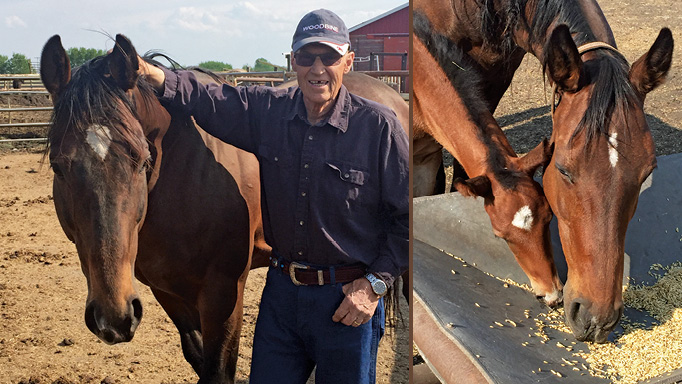Saskatchewan’s flat prairie landscape takes a dramatic turn in the northwestern region around Meadow Lake. Winding creeks, tall birch trees, and rolling hills are reminiscent of Vermont or the towns in a Dick Francis novel. Nestled on 1,300 acres of this beautiful countryside is The Alger Stallion Station, the family farm of Gordon and Rosalind Alger.
Gordon was born in Meadow Lake in 1938 and was raised on a cattle ranch. Gordon started his career in the business racing and showing Quarter Horses, buying his first thoroughbred mare on April 8, 1978 from Pete Heppner. She went into foal the night he brought her home and he named the foal Sparkling Sindy. Gordon fondly and jokingly reminisces that she was the worst thing that ever happened to him – from then on he was hooked on thoroughbred racing.
In the early 80’s, the Algers invested in Rally On by Sir Gaylord, the stallion that started their lifetime dedication to breeding. The couple has since had more stallions and bred more stakes winners than they can count, with over $1 million in purses won by their mare’s offspring alone. They always strove for the best, procuring offspring of famous stallions including Seattle Slew, Vice Regent, Raise a Cub, Danzig and Grand Slam.
To find stallions to stand for stud, Gordon spent countless hours studying bloodlines and ensuring that he chose stallions in fashion. He travelled to California to purchase mares in foal and bought many from Kentucky via Alberta, in order to strengthen the bloodlines on his farm.
Today, the Algers’ efforts have paid off. Gordon wins yearly awards from the Saskatchewan Chapter of the Canadian Thoroughbred Horse Society, and in 2013, he won six of the 10 awards available, including Breeder of the Year, Horse of the Year, Top Brood Mare of the Year, and Top Colt and Top Filly of the Year. Gordon was excited that a filly he bred, Bells of Victory, beat Premier Wall her first time out in 2014.
“You’re very lucky if you can spend your life doing what you love,” he said.
Gordon’s love for his horses and his career as a breeder is evident as he proudly walks around his farm, moving from the stallions to the yearlings, to the broodmares and the foals. While we chat in the mares’ paddock, the mares and foals eat their oats, coming around to investigate their guests. I am instantly moved by the twinkle in Gordon’s eyes as he tells me their stories and recounts the past.
Gordon recommends those entering the business to start slowly with syndicates and one horse at a time. This allows people to share the highs and lows and to learn about the business. Gordon’s long-term commitment to the industry is evident in his belief that it takes two lifetimes to build a successful breeding operation and that it is a never-ending learning experience.
Over 35 years in the industry have given Gordon a unique perspective on the issues surrounding thoroughbred racing and breeding in Western Canada. He believes that the greatest aim of a successful industry is that everyone works together for the good of the sport: whether between individuals, jurisdictions, or organizations. With the challenges that racing has faced recently, Gordon believes that individuals should put the good of the industry before personal gain.
He also recognizes the value of gov¬ernment support to the success of this agricultural industry, and the prairie prov¬inces are an excellent example. In 2015, there was $70,500 in funding added to purses in Saskatchewan compared to the $2,386,070 that Alberta’s Breed Improve¬ment Program provided through purse money and breeding support. The difference is apparent in the numbers of foals regis¬tered, with 29 and 245 respectively in 2013.
“Everything chases the dollar, good horses, good trainers. With no money, things start disappearing,” he said
Gordon and Rosalind Alger are legends in Saskatchewan and they are a shining example of the hard work and dedication of many breeders in Canada. They have created a rich life through their involvement in the industry and their enthusiasm and passion for racing and breeding is evident.
The Algers’ contribution and impact on the racing community in Saskatchewan will be felt for many future generations of Canadian thoroughbreds.


